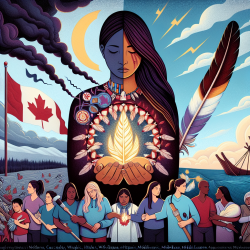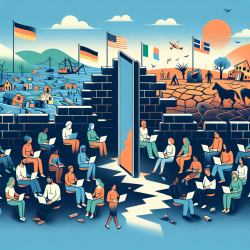Introduction
As practitioners committed to improving outcomes for children and families, understanding the broader historical and cultural contexts that shape our clients' experiences is essential. The research article, "My Parents, My Grandparents Went Through Residential School, and All this Abuse has Come From it: Examining Intimate Partner Violence Against Canadian Indigenous Women in the Context of Colonialism," provides critical insights into the intersection of intimate partner violence (IPV) and colonial history among Canadian Indigenous women.
Key Findings
The study explores the narratives of 40 Indigenous women from Canada's prairie provinces, highlighting the profound impact of colonization, including residential schools, on family structures, spiritual beliefs, and languages. These historical traumas are intricately linked to the IPV experienced by these women. Notably, the research found that:
- Indigenous women are abused by intimate partners at rates significantly higher than non-Indigenous women.
- Many Indigenous women have experienced severe physical and sexual violence, often with life-threatening consequences.
- Colonial practices, such as residential schools, have disrupted traditional family roles and contributed to intergenerational trauma.
Implications for Practitioners
For speech-language pathologists and other practitioners working with Indigenous communities, this research underscores the importance of culturally sensitive approaches that consider historical trauma. Here are some actionable steps:
- Educate Yourself: Gain a deeper understanding of the historical context of colonization and its ongoing impact on Indigenous communities.
- Build Trust: Establish trust with Indigenous clients by acknowledging their unique cultural and historical backgrounds.
- Collaborate with Indigenous Leaders: Partner with Indigenous community leaders and organizations to ensure culturally appropriate interventions.
- Advocate for Policy Change: Support policies that address systemic inequalities and promote healing and reconciliation.
Encouraging Further Research
While this study provides valuable insights, it also highlights the need for more research that incorporates Indigenous perspectives and experiences. Practitioners are encouraged to engage in or support research that explores the intersection of IPV and colonialism, ensuring that Indigenous voices are central to these efforts.
Conclusion
Understanding the complex interplay of historical trauma and IPV is crucial for practitioners aiming to create positive outcomes for Indigenous women and their families. By integrating this knowledge into practice, we can contribute to healing and empowerment within these communities.
To read the original research paper, please follow this link: My Parents, My Grandparents Went Through Residential School, and All this Abuse has Come From it: Examining Intimate Partner Violence Against Canadian Indigenous Women in the Context of Colonialism.










